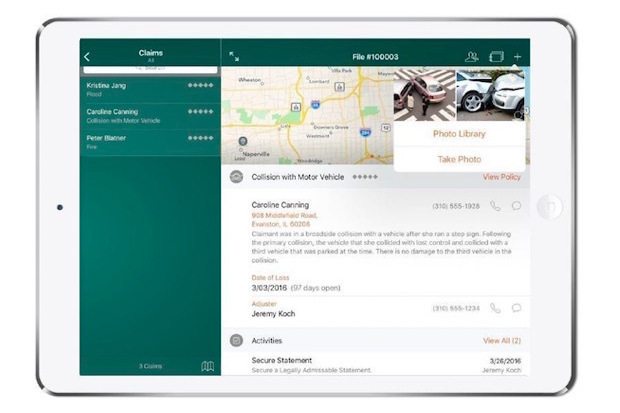Apple, IBM and the digital transformation of everything


IBM and Amica, the oldest US mutual automobile insurer, have announced a new Apple + IBM outcome in which iPads and iPhones will be used to handle insurance claims. I caught up with IBM and Amica to talk about it.
iOS is getting everywhere
The insurer is to use the IBM MobileFirst for iOS Claims Adjust app, one of over 100 industry-specific iOS apps Apple and IBM have developed together over the last two years. Big enterprise firms including Abu Dhabi Islamic Bank, Air Canada, Alior Bank, Boots UK, Bosch Home Appliance Group, Japan Post, Scandinavian Airlines and Vodafone Netherlands all make use of Apple + IBM apps.
(In related news, VU University Medical Center Amsterdam today announcedits deployment of a suite of IBM MobileFirst for iOS apps to help improve collaboration amongst its healthcare teams. )
You will find more specific information concering the Amica deal in the press release.
I spoke with Mahmoud Nagshineh, general manager, Apple partnership, IBM and Adam Kostecki, claims officer in Amica’s claims executive department to learn a little more.
On Apple and IBM
“Nearly two years ago, we partnered with Apple to change how people work. Today, with clients like Amica, that’s exactly what’s happening,” said IBM’s Nagshineh.
“Mobile continues to be a top priority for enterprise and, together with Apple, we’re transforming enterprise mobility through a new class of business apps that bring IBM’s big data and analytics capabilities with a consumer-grade experience to Apple devices in the enterprise.”
From a buzz word understood by Apple, IBM, Microsoft and key players like Orange Business Services, the cultural importance of digital transformation is now understood by every enterprise (and the ones that don’t get it won’t be around for long).
It’s critical to understand that digital transformation isn’t just about using mobile devices and spangly apps, it also requires root and branch change across existing corporate culture, including internal and external relationships. This transformation is breaking down old ways of working, enabling new opportunity and empowering for employees.
Fit for change
At Amica, the move to adopt the IBM + Apple solution is directly focused on such change:
“Mobility is driving digital transformation — it’s a critical component for changing the way we do business, delivering a better experience to our customers while increasing the efficiency of our staff,” said Kostecki (who is also part of the company’s enterprise innovation team).
“By putting readily available data and information in the palm of our adjusters’ hands on iPadPro, we’re not only boosting the productivity of our field adjusters, but also changing the way they engage with our customers. Adjusters have quick, simple access to all the information they need while in the field, so they can make on-the-spot decisions and better inform customers about their claims.”
Naturally, IBM is keen to portay the Amica relationship as a poster child for the iOS enterprise. “Amica is an example of digital transformation in action, empowering employee to work in ways not previously possible,” said Naghshineh. “We’ve seen repeatedly that IBM MobileFirst for iOS apps not only help companies boost customer service, but are also a powerful tool to attract and retain top-tier talent.”
“We see this as an opportunity to increase engagement among our field adjusters, as well as attract new talent that is accustomed to using the latest technologies,” explained Kostecki. “We’re providing them with a mobile experience at work that mirrors the one they expect as consumers.”
Good practice
Is it working? It is early days in the project, but Kostecki seems keen on what he’s seen so far. Anecdotally at least his teams seem pleased at the way in which the solution will save time.
The insurer has plainly picked up good advice on deployment, introducing an enterprise-wide social networking site in which its employees can learn more about the app, ask questions and help each other. That’s precisely the kind of support all the digital transformation analysts recommend.
Apple’s surfing this wave
What does this mean for Apple? On the surface it would be easy to ignore Apple’s place in this, but doing so would be a mistake. Not only is the company putting solid investment into building out its enterprise offer by working in key partnerships, such as with IBM; but it is also consolidating its existing status as the most widely deployed mobile platform among enterprise users.
It has acquired this status by focusing on usability and security, and by ensuring its platforms are peer players for some Windows-based deployments (which took years to achieve). Its ability to reach significant partnerships with key players in the enterprise space also sets it apart, as to does its commitment to regular software updates and its non-fragmented platform.
The company has been shrewd to position itself within this space.
Martin Kuppinger, principal analyst at security consultants KuppingerCole says digital transformation is unstoppable across every enterprise, “It is far wider than just the internet of things,” he told the 2015 European Identity & Cloud(EIC) conference. “Just think about smart manufacturing, smart wallets, smart vehicles, smart homes, smart grids, e-books, digital music, online retail and online payments,” he said.










